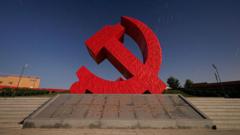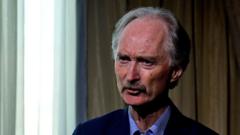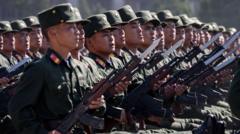A significant Russian money laundering network has been uncovered by the National Crime Agency (NCA), revealing ties to UK drug gangs during the Covid-19 lockdown. The operation, managed from Moscow, involves the exchange of dirty money for cryptocurrency, complicating law enforcement's efforts to track illicit finances. Key figures have been arrested, and sanctions have been placed by the US on those linked to the scheme, further uncovering the network's connections to espionage activities in Russia.
Major Russian-Led Money Laundering Operation Uncovered Tied to UK Drug Gangs

Major Russian-Led Money Laundering Operation Uncovered Tied to UK Drug Gangs
The National Crime Agency reveals a sophisticated money laundering network involving Russian criminals and UK drug gangs, facilitating the exchange of illegal drug profits for cryptocurrency amidst pandemic lockdowns.
A comprehensive investigation led by the National Crime Agency (NCA) has unveiled a vast multi-billion-dollar money laundering scheme that interlinks Russian criminal factions and UK drug gangs. This operation emerged during the lockdown period when UK criminal organizations struggled to dispose of large quantities of cash from illegal street sales, which hampered their ability to procure narcotics, specifically cocaine from South America.
According to NCA officials, investigators have identified a Russian-speaking network lodged within the UK drug market and affiliated with the Russian state. This is considered the most significant breakthrough in money laundering enforcement in over a decade. The NCA's findings suggest that this global operation, based in Moscow, has facilitated the laundering of illicit cash for substantial fees while enabling drug trafficking organizations to convert their proceeds into untraceable cryptocurrency. The scale of this operation stretches across 30 countries, with 84 individuals arrested thus far, including 71 in the UK.
UK Security Minister Dan Jarvis highlighted the operation's revelations, stating it has exposed various elements, such as "Russian kleptocrats, drug gangs, and cybercriminals," all reliant on the circulation of illicit finances. The United States Treasury has also moved forward with sanctions against key figures within the operation, seeking to disrupt their activities.
A key player in this operation is Ekaterina Zhdanova, who heads a cryptocurrency network called Smart. Previously sanctioned by US authorities in November 2023 for her extensive connections to Russian elites, Zhdanova is now identified as central to this laundering endeavor. US Treasury acting officials reiterated their commitment to thwarting Russian attempts at utilizing digital assets for diversionary purposes.
Rob Jones, the NCA's director general of operations, emphasized that the connections between Russian elites, cybercriminals well-versed in cryptocurrency, and UK drug operations remained hidden until now. He expressed confidence in disrupting these networks at the highest levels.
The initial clues leading to this complex operation surfaced during the 2021 lockdown, when UK drug gangs faced challenges in moving their cash into the legitimate financial ecosystem. The cryptocurrency networks Smart and TGR, both operating out of Moscow, offered solutions to these challenges during the pandemic by enabling swift conversion of cash into digital currency.
These networks, capitalizing on large reserves of cryptocurrency amassed from ransomware attacks, struck deals with UK drug gangs for expedited cash exchanges. The Russian-led enterprise charged commissions for laundering services, running their operations through seemingly legitimate businesses in the construction sector or utilizing couriers to transport cash internationally.
The first breakthrough occurred when law enforcement detained Fawad Saiedi, a courier found with £250,000, who later confessed to orchestrating the movement of £15.6 million of illicit funds. The investigation subsequently uncovered interconnected schemes operated by various individuals participating in these drug networks, including those linked to the notorious Kinahan cartel.
Among other couriers, Semen Kuksov, whose family has ties to the Russian oil industry, was implicated in laundering over £12 million within a short timeframe before being sentenced to a substantial prison term. To date, the NCA has seized approximately £20 million linked to an estimated £700 million in drug sales, with the overwhelming majority of arrests tied to couriers involved in this operation.
As investigations proceed and payment channels for drug trafficking become increasingly compromised, NCA officials warn of the emerging risks for anyone attempting to transfer narcotics earnings. The recent US sanctions against significant figures in the network have galvanized efforts to dismantle the entire system, with multiple connections between the scheme and espionage efforts allegedly sanctioned by the Russian government.
For the UK, this situation not only underscores persistent challenges in tackling organized crime but also shines a light on the potential for further corruption and illicit activity supported by state actors.























